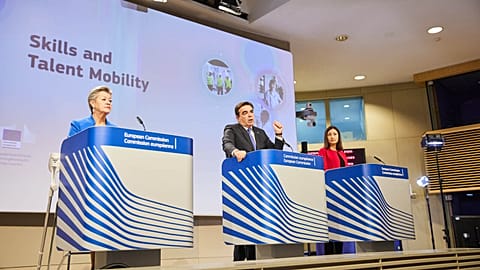Germany's immigration law reforms will be introduced in three stages starting in November this year.
The first stages of a new law that will make it easier for skilled workers from outside the EU to move to Germany are expected to come in November.
 ADVERTISEMENT
ADVERTISEMENT
 ADVERTISEMENT
ADVERTISEMENT
The German government gave its final approval for the law in July this year. It is expected to come into force in three steps in November 2023, March 2024 and June 2024.
The new law aims to attract skilled foreign workers and combat labour shortages in the country.
The plans to modernise the country's immigration legislation are expected to make it easier for third-country nationals to work in Germany. It could increase the number of non-EU workers in Germany by 60,000 per year.
The reforms to the Skilled Immigration Act particularly focus on workers with vocational, non-academic training. Existing rules for qualified professionals with university degrees will also be relaxed.
Why is Germany changing its immigration policies?
Like many countries in Europe, Germany is facing a shortage of skilled workers.
In 2022, the country's labour shortage rose to an all-time high: the Institute for Employment Research (IAB) found 1.74 million vacant positions throughout Germany.
In July last year, staff shortages affected almost half of all companies surveyed by Munich-based research institute IFO, forcing them to slow down their operations.
It hopes to fill this gap with qualified professionals from outside the EU. But currently, red tape is slowing down the country's immigration process.
During a press conference held at the Federal Office for Foreign Affairs (BfAA) on 17 January 2023, Federal Foreign Minister Annalena Baerbock said modernising the visa process would mean “turning it upside down”.
Together with Federal Chancellor Olaf Scholz, she emphasised removing bureaucracy and improving the digitisation and efficiency of the system.
“We know that we can only guarantee our future, the efficiency of our economy and the efficiency of our social security systems if we have enough skilled workers at our disposal,” said Scholz.
“From within the European Union, that's not so difficult, because there is freedom of movement. With regard to the rest of the world, it is a greater challenge,” he added.
How does Germany plan to attract skilled foreign workers?
Germany is hoping to combat its shortage of skilled workers with a new ‘opportunity card’.
The ‘chancenkarte’ will use a points-based system to enable workers with the required skills to come to Germany more easily.
It is part of a strategy proposed by Labour Minister Hubertus Heil to address the country’s labour shortages and is aimed at people who do not yet have a work contract in Germany.
The points-based system will take into account qualifications, professional experience, age, German language skills and ties to Germany such as family members in the country.
Every year, quotas will be set depending on which industries need workers. Three out of four of the following criteria must also be met to apply for the scheme:
- A degree or vocational training
- Three years of professional experience
- Language skills or a previous stay in Germany
- 35 years old or younger
Currently, most non-EU citizens need to have a job offer before they can relocate to Germany. A visa for job seekers already exists, but the 'chancenkarte' is expected to make it easier and faster for people looking to find work in Germany.
Citizens of certain countries with visa agreements can already enter Germany for 90 days visa-free but are only permitted to take up short-term employment.
The opportunity card will allow people to come and look for a job or apprenticeship while in the country rather than applying from abroad. Applicants must be able to prove they can afford to pay their living expenses in the meantime.
The exact details of the scheme are yet to be formalised. The chancenkarte is not expected to be available until at least the end of 2023.
What are the main changes to Germany's immigration policies?
Firstly, the new system will make it easier for people with professional experience - rather than a university degree - to come and work in Germany.
Secondly, Germany will become more open to job experience and professional qualifications that are recognised in workers' native countries. Currently, the country is strict about which qualifications it recognises.
Thirdly, it will be easier for those without a job offer to seek work in Germany via the opportunity card.
Qualified job seekers with degrees or vocational certificates will be allowed to stay in the country for one year as they search for employment. While looking for full-time employment, they will be permitted to work up to 20 hours per week.
Rules will also be eased for those with a job offer and a recognised diploma. Salary thresholds will be lowered, it will be easier for workers to bring their families to Germany, and it will be easier to gain permanent residency.
Which industries are worst hit by staff shortages in Germany?
Germany is specifically seeking skilled craftspeople, electrical engineers, IT specialists, carers, nurses, catering and hospitality professionals.
An IFO survey shows the service sector is the worst hit - especially the accommodation and event industries.
This is followed by warehousing and storage, service providers, and manufacturing - particularly in the food, data processing equipment, machinery and metal manufacturing sectors. Many retail businesses, construction companies and wholesalers have also reported staff shortages.
IT specialists with relevant job experience will receive EU Blue Cards even if they do not possess a university degree, according to German news channel DW.
Other in-demand occupations listed on the government website include physicians and scientists. A shortage of metallurgy workers and builders has previously been reported.
The pharmaceutical and chemical industries report the lowest shortage of skilled workers. The automotive and mechanical engineering industries are also suffering less than other sectors.

















